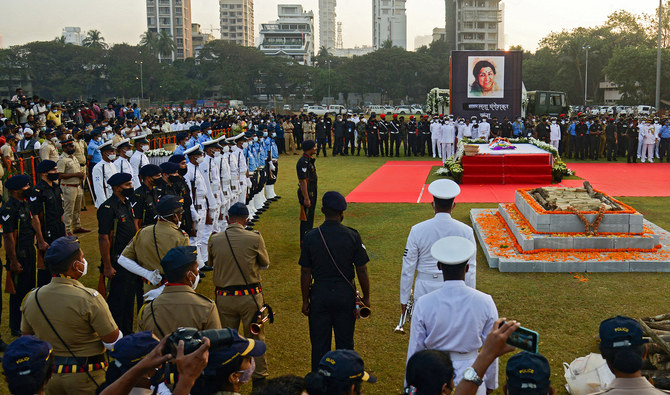MUMBAI: Lata Mangeshkar, one of India's best known cultural icons and a singer who defined music for generations of her countrymen, died on Sunday and was given a state funeral as politicians and personalities united in mourning.
Mangeshkar, 92, made her name in the world of Bollywood and her voice has rung out on television sets, on crackly airwaves and from movie theatres for most of independent India's three quarters of a century, earning her the name "the Nightingale".
"I am anguished beyond words," Prime Minister Narendra Modi wrote on Twitter. "She leaves a void in our nation that cannot be filled."
Modi joined mourners at a packed open air state funeral late on Sunday after her body, wrapped in the Indian flag, had been paraded through the streets of her home city Mumbai on a truck decorated with flowers.
Thousands of people gathered around Shivaji Park, where she was cremated, climbing walls and trees to get a glimpse of the proceedings and pay their own respects however they could, despite police erecting barricades and restricting public entry.
The government will observe state mourning with the flag at half-mast through Monday, the Home Ministry said.
Mangeshkar died of "multi-organ failure after more than 28 days of hospitalization post COVID-19", said Pratit Samdani, who was treating her at Mumbai's Breach Candy Hospital, according to Reuters TV partner ANI.
"The coming generations will remember her as a stalwart of Indian culture, whose melodious voice had an unparalleled ability to mesmerise people," Modi wrote.
Other Bollywood personalities and politicians also paid their tributes. "The voice of a million centuries has left us," veteran actor Amitabh Bachchan said.
Maharashtra, Mangeshkar's home state, declared a public holiday on Monday. India's central bank rescheduled its monetary policy committee meeting by a day to Feb. 8-10 due to the holiday. The policy decision is now expected on Thursday.
The state of West Bengal declared a half-day holiday and urged the administration to play Mangeshkar's songs at important crossings all over the state for 15 days.
The Indian Cricket Team wore black armbands as they kicked off the first of three one-dayers against the West Indies. Former Indian captain Virat Kohli said her songs had touched people around the world. Another former captain, Sachin Tendulkar, was among those at the funeral.
Born in 1929 in pre-independence India, Mangeshkar began singing in her teens, and in a career spanning 73 years sang more than an estimated 15,000 songs in 36 languages.
She enthralled music-mad Indians with her lilting voice and sheer range, singing everything from patriotic songs to romantic numbers, both in films and albums.
The world of Bollywood - where movies were unthinkable without at least six songs and where everything from romance to grief was narrated with the help of a ballad - was where Mangeshkar cut her teeth.
Classically trained, Mangeshkar molded her voice to the demands of singing for Bollywood movies, even voicing songs in her 60s for an actress who was in her 20s.
Her songs motivated millions of Indians during wars with China and Pakistan to pay homage to the defense forces. Some of her songs are used as prayers in temples, shrines and schools.
"My voice is a gift from God," she once told an interviewer. "I learned to emote through my voice. When I sang a lullaby, I became a mother, when it was a romantic song, I was a lover."
The only songs she refused to sing were cabaret numbers and songs that had bawdy or racy lyrics, saying those did not fit with her personal values. Mangeshkar, nevertheless, dominated the Hindi film industry for almost five decades until the 2000s, along with her younger sister Asha Bhosle.
Detractors accused her of using her Bollywood clout to limit the entry of newcomers. Her influence was such that Mumbai authorities in 2006 scrapped a planned highway flyover after she objected that it would disturb her privacy.
Known for soft-spoken nature and wearing a saree, her hair in two schoolgirl-like braids, Mangeshkar received India’s highest civilian honor, the Bharat Ratna, in 2001. She was awarded France's highest civilian honor, the Legion of Honour, in 2009.
"Music is incomplete without your voice," actor Amitabh Bachchan said of Mangeshkar in 2019, commemorating her 90th birthday. "It has done the work of saints."














